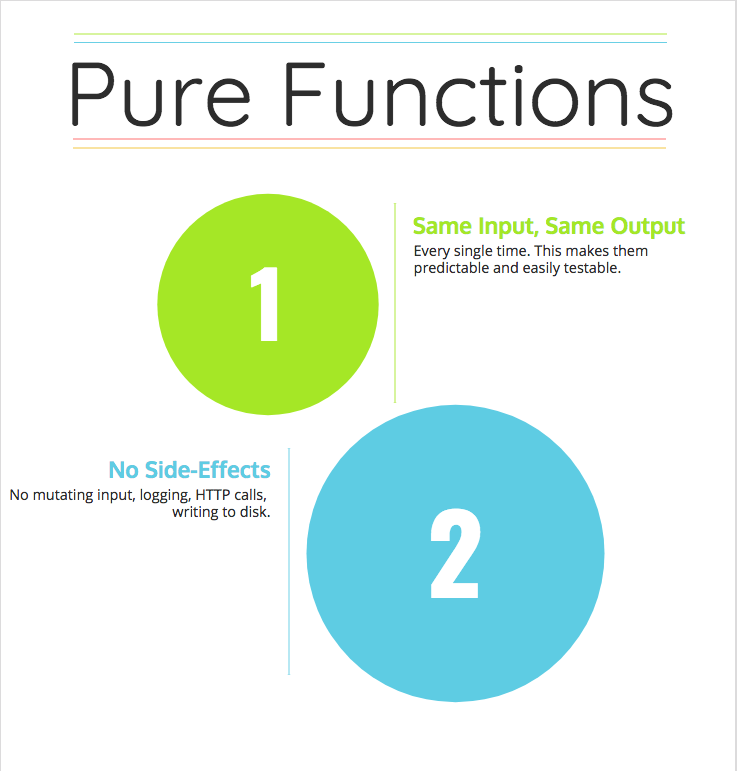The Checklist
Pure functions are the atomic building blocks in FP, adored for their simplicity and testability. Not every function is pure, however, and this section discusses how to judge one for yourself. (5 min. read)
We'll cover the following
Pure Functions
A function must pass two tests to be considered “pure”
- Same inputs always return same outputs
- No side-effects
Ramda obeys these rules to facilitate FP in JavaScript. Let’s zoom in on each one.
Same Input => Same Output
Compare this:
const add = (x, y) => x + y;add(2, 4); // 6
To this:
let x = 2;const add = (y) => {x += y;};add(4); // x === 6 (the first time)
The first example returns 6 if given 2 and 4, no matter when you call it. The second example increments an outside variable by the given y.
This shared state introduces a time dependency–you get different results depending on when you called the function. The first time results in 6, next time is 10 and so on.
Which version’s easier to reason about? Which one’s less likely to breed bugs that happen only under certain conditions? Which one’s more likely to succeed in a multi-threaded environment where time dependencies can break the system? Definitely the first one.
No Side-Effects
This test itself is a check-list. A few examples of side-effects are
- Mutating your input
console.log- HTTP calls (like AJAX/fetch)
- Changing the filesystem
- Querying the DOM
Basically any “side work” you perform that isn’t related to calculating a function’s final output. Violating this rule can lead to the state management issues we just discussed.
Here’s an impure function with a side-effect
const impureDouble = (x) => {console.log('doubling', x);return x * 2;};const result = impureDouble(4);console.log({ result });
We hardly call this a side-effect because, in all practicality, it won’t harm us. We’ll still get the same outputs, given the same inputs.
This, however, may cause a problem
const impureAssoc = (key, value, object) => {object[key] = value;};const person = { name: 'Bobo' };const result = impureAssoc('shoeSize', 400, person);console.log({ person, result });
The variable, person, has been forever changed because our function introduced an assignment statement.
Shared state means impureAssoc's impact isn’t fully obvious anymore. Understanding its effect on a system now involves tracking down every variable it’s ever touched and knowing their histories.
Shared state = timing dependencies.
We can purify impureAssoc by simply returning a new object with our desired properties.
const pureAssoc = (key, value, object) => ({...object,[key]: value});const person = { name: 'Bobo' };const result = pureAssoc('shoeSize', 400, person);console.log({ person, result });
Now pureAssoc returns a testable result and we’ll never worry if it quietly mutated something elsewhere.
You could even do the following and remain pure
const pureAssoc = (key, value, object) => {const newObject = { ...object };newObject[key] = value;return newObject;};const person = { name: 'Bobo' };const result = pureAssoc('shoeSize', 400, person);console.log({ person, result });
Mutating your input can be dangerous, but mutating a copy of it is no problem. Our end result is still a testable, predictable function that works no matter where/when you call it. The mutation’s limited to that small scope and you’re still returning a testable result.
Summary
-
A function’s pure if it’s free from side-effects and returns the same output, given the same input.
-
Side-effects include: mutating input, http calls, writing to disk, printing to the screen.
-
You can safely mutate your input’s clone, just leave the original one untouched.
-
Spread syntax is the easiest way to clone objects and arrays.
const person = { name: 'Bobo' };const personClone = { ...person };const people = ['Bobo', 'Barry', 'Bruce'];const peopleClone = [...people];personClone.name = 'Sam';peopleClone[0] = 'Sam';console.log({person,personClone,people,peopleClone});
